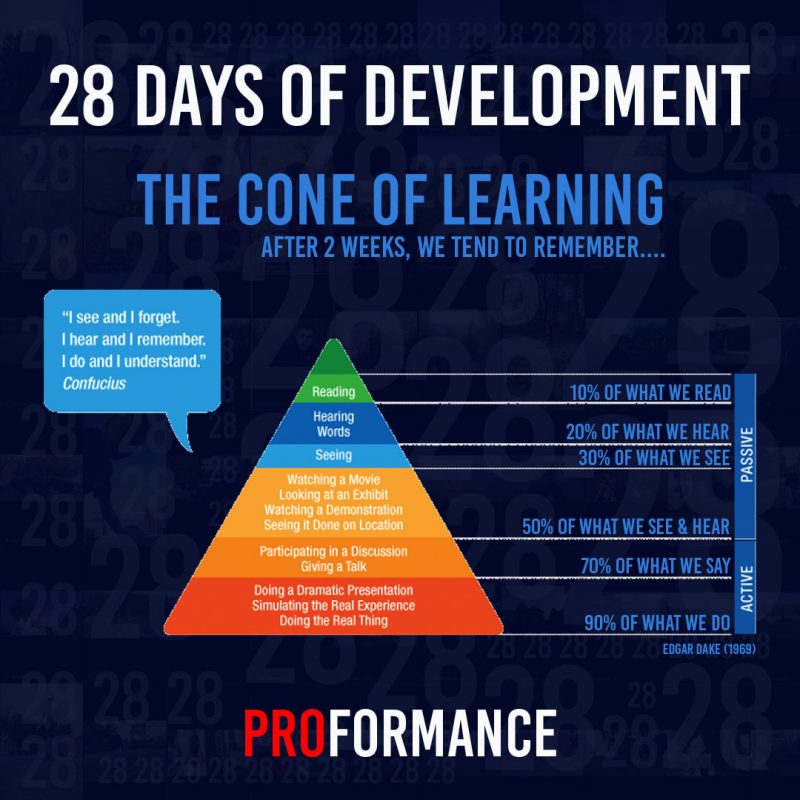At the risk of being repetitive, I wanted to continue to talk about, REPETITION! Yesterday gave an overview of why repetition can help improve certain areas of performance.
Repetition will enable young people to be able to commit football skills to muscle memory. This over time almost allows skills to become automatic, so when a player is in a match, they can perform skills without thinking.
Those skills do need to be learned correctly though. If you learn a skill badly, then you are not helping yourself, this is why working with ProFormance on Zoom enables you to see and perfect skills with feedback. Committing the correct technique to muscle memory and helping you become a better player.
The learning cone below gives you an excellent overview of why Zoom can help you develop. By taking part in the 28 days of development will take you through the full spectrum of the learning cone and commit skills to your long term memory.

We combine all the areas of the learning cone, from reading, to hearing, to seeing, participating with feedback, and actually doing the football actions. There isn’t anything from this cone of learning that we can not replicate within the Zoom sessions.
The path to success is to learn different components of the game. Those components can be defined through a four corner model (Technical, Physical, Psychological, Social) in England or if different ways in different countries. The easiest component to develop in isolated practice is technique. Other areas of the game will overlap, there are psych and social benefits, and at ProFormance there are Zoom classroom sessions for game analysis, but in the main the focus in on technical development.
A players football journey will be influenced by genetics and environmental factors but the acquisition of skills is highly modifiable. Isolated practice is focusing on one skill at a time and this helps players break down each skill, learn the detail, and increase speed over time.
Isolated practice like hitting a cross bar has a clear result, you hit it or you don’t and you then try again. You adjust how you strike the ball based on the previous result. This sort of practice is what we hear from stories of Beckham and Ronaldo, working hard on their own in their garden as a child. Zoom practices are the modern version of this, working on individual skills, progressing, and using constant repetition to develop.
Technical actions can easily be taught, coaches can help you adjust but it’s hard to teach touch. Touch though is developed through feeling it has to be from the player but repetition is vital. It can and will still be improved during Zoom sessions. Without repetition you will never develop the right mechanics for skills or your touch. Over this 28 day period players will also learn how to teach themselves, how to analyse their performance, and how to keep progressing into the future.
As skill is developed, as said earlier, football actions are stored into muscle memory, the repetition allows you to transfer technical skill to a game situation. The hardest thing is to develop complex interactions with other players, of course this is a challenge, when we are all in isolation. As much as we can discuss how your skills relate to the game, your relationships with others occurs over years of learning. It’s hard enough as an adult to read people, predict what they are going to do, so players shouldn’t push themselves to develop in this area at this time. We need to blend team practices with individual development. In general team sessions you will hardly ever do isolated practice so these 28 days of development gives you a real chance to focus on that for a change.
Repetition is important. But we also understand the theory of ‘repetition without repetition’ (Bernstein (1967). Being consistent with the process of skill development, being comfortable in your environment, we are looking to repeat the problem but make players find different solutions. Asking players to make different decisions and increase the challenges to enable the players to develop a larger capacity to solve problems. This keeps the Zoom sessions fresh, not boring, of course the skills can be the same, but the application is different.
As well as the benefits of repetition, during Zoom sessions, players have a large number of touches, far and away more than they would have compared to playing in a match. The benefits of developing at home over the next 28 days will be a huge advantage to those who invest in themselves.